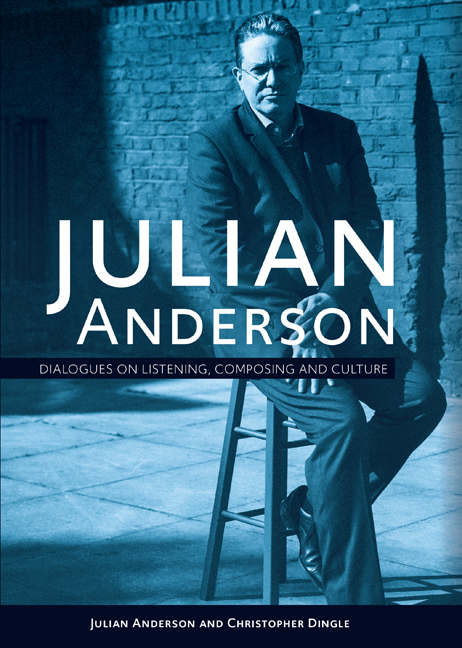Book contents
- Frontmatter
- Contents
- List of Illustrations
- Foreword
- Acknowledgements
- Introduction
- Prelude – Jeux: A Conversation Over Lunch
- Conversation One Origins
- Conversation Two Enthusiasms
- Conversation Three Training
- Conversation Four Dance
- Conversation Five Folk
- Conversation Six Composing (or Not)
- Conversation Seven Understandings
- Conversation Eight Beginnings (and Endings)
- Conversation Nine Puzzles
- Conversation Ten Singing
- Conversation Eleven Olly
- Conversation Twelve Memory
- Conversation Thirteen Opera
- Conversation Fourteen Practices
- Conversation Fifteen Outsiders?
- Conversation Sixteen Quartets
- Conversation Seventeen Advocacy
- Conversation Eighteen Partnerships
- Coda: Multiple Choices
- Chronology
- List of Personae
- Glossary of Musical Terms
- Macrotonality
- Catalogue of Published Works by Julian Anderson
- List of Recordings of Julian Anderson’s Music
- Bibliography
- Discography
- Index
Conversation Eleven - Olly
Published online by Cambridge University Press: 16 September 2020
- Frontmatter
- Contents
- List of Illustrations
- Foreword
- Acknowledgements
- Introduction
- Prelude – Jeux: A Conversation Over Lunch
- Conversation One Origins
- Conversation Two Enthusiasms
- Conversation Three Training
- Conversation Four Dance
- Conversation Five Folk
- Conversation Six Composing (or Not)
- Conversation Seven Understandings
- Conversation Eight Beginnings (and Endings)
- Conversation Nine Puzzles
- Conversation Ten Singing
- Conversation Eleven Olly
- Conversation Twelve Memory
- Conversation Thirteen Opera
- Conversation Fourteen Practices
- Conversation Fifteen Outsiders?
- Conversation Sixteen Quartets
- Conversation Seventeen Advocacy
- Conversation Eighteen Partnerships
- Coda: Multiple Choices
- Chronology
- List of Personae
- Glossary of Musical Terms
- Macrotonality
- Catalogue of Published Works by Julian Anderson
- List of Recordings of Julian Anderson’s Music
- Bibliography
- Discography
- Index
Summary
What follows is, in essence, Anderson's tribute to his close friend, Oliver Knussen. After my initial prompt, it required no input from me.
OLIVER KNUSSEN, 12 JUNE 1952–8 JULY 2018
CD: This is 9 July 2018. We’ve just had the news today that Olly Knussen has died. Obviously he's a very close and important figure for you. Would you like to share your thoughts on Olly and what he means to you in all sorts of respects?
JA: I’ve noticed that when famous people die, most people talk about themselves. This is probably because they don't want to think about death. They immediately think about themselves in relation to the deceased – talking about themselves is, in a way, some kind of comfort. So, inevitably, some of what I say is going to involve myself here.
Olly Knussen was such a huge part of musical life internationally that it's very hard for somebody my age to imagine it without his presence. Given that we met in early 1981, we knew each other 37 years. So quite apart from his international prominence, I’ve known him far longer than I’ve known any other musician. I am, naturally, very shocked by his death. Although his health had been worrying for some years, it does come as a surprise. It's hard to be objective about the death of someone who was part of your life for that long.
The funny thing about Olly Knussen is that, although I was becoming aware of contemporary music in the late ‘70s, I discovered his music later than that of many other recent composers. I missed the broadcast premiere of his Third Symphony at the Proms in 1979. I’d never heard the name then – it's fair to say that until the Third Symphony premiere Olly was not so prominent here, and he’d only returned from the US three years before that. More recently, while doing research on other things, I accidentally saw an archive copy of the Radio Times for the week of that premiere and it rang a bell. The blurb about his music was rather misleading, making it appear vaguely eclectic, and I have a distant memory of reading that and deciding not to bother listening as a result. Which shows promoters how attempts to second-guess the audience can be very misguided.
- Type
- Chapter
- Information
- Julian AndersonDialogues on Listening, Composing and Culture, pp. 213 - 224Publisher: Boydell & BrewerPrint publication year: 2020

